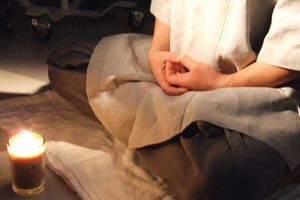Traditional Buddhist practice emphasizes the realization of our original mind. Won Buddhist practice puts more emphasis on using our mind. Sotaesan, the founding master of Won Buddhism, said that a living religion or practice is not separate from our ordinary lives, and that Buddhadharma exists for the sake of our life, not the other way around. Won Buddhist practice is characterized by a balanced and simultaneous practice of the Threefold Practice in our daily lives. Mindfulness in daily life is the essence of Won Buddhist practice.
 Timeless Meditation
Timeless Meditation
Timeless Zen is the way of practicing meditation at all times, every day. It is not only the way to maintain a peaceful, focused, and right state of mind, but it is also a way to use our original mind well in our daily activities.
Authentic practice begins with realizing our true nature, and based on that realization, we practitioners cultivate our original mind through meditation. The fruit of being enlightened to and nurturing our original mind is the ability to use our minds properly to enrich our lives.
Timeless Zen is the simultaneous practice of Spiritual Cultivation, Dharma Study, Mindful Choice in Action in our daily lives. Timeless Zen is a mind-training with four stages and in the Zen tradition is compared to taming an ox.
Taking Hold of the Mind
Watching the Mind
Forgetting the Mind
Utilizing the Mind
The Four Great Principles below represent the core of the Won Buddhist teaching.
Right Enlightenment and Right Practice
Awareness of Grace and requital of grace
Practical Application of Buddhadharma
Selfless Service to the Public
means that we should abandon egoism and self-indulgence for ourselves and our families and devote ourselves to the noble task of delivering sentient beings by means of the altruistic practice of
The Essential Dharmas of Daily Practice
- The mind is originally free from disturbance, but disturbances arise in response to sense-objects; let us maintain the Samadhi of our original nature by letting go of those disturbances.
- The mind is originally free from delusion, but delusions arise in response to sense-objects; let us maintain the wisdom of our original nature letting go of those delusions.
- The mind is originally free from wrong-doing, but wrong-doings arise in response to the sense-objects; let us maintain the precepts of our original nature by letting go of those wrong-doings.
- Let us remove disbelief, greed, laziness, and ignorance by means of belief, zeal, questioning, and dedication.
- Let us turn a life of resentment into a life of gratitude.
- Let us turn a life of dependency into a life of self-reliance.
- Let us turn a reluctance to learn into a willingness to learn well.
- Let us turn a reluctance to teach into a willingness to teach well.
- Let us turn a lack of public spirit into an eagerness for the public’s welfare.
